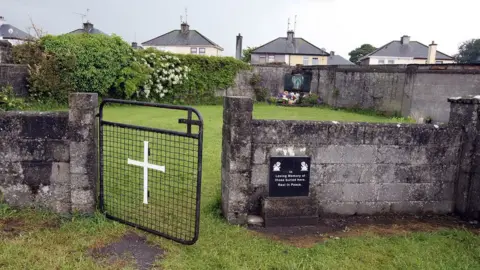Mother and baby homes: Michael D Higgins signs bill into law
 AFP/Getty Images
AFP/Getty ImagesIrish President Michael D Higgins has signed a mother and baby homes bill into law after "careful consideration".
The government won a Dáil (Irish Parliament) vote on the controversial bill by 78 votes to 67 last week.
A presidential statement said concerns raised in the discussion of the bill were "serious and must be addressed".
The legislation relates to records gathered by the Mother and Baby Homes Commission.
Much of the evidence it heard was given in private and legally protected.
A database of 60,000 records is to be transferred to the child and family agency Tusla, while the remaining records will be sealed for 30 years.
But campaigners on behalf of the mothers and their children have expressed fears they will not be able to access their records if they are sealed.
Minister's regrets
The statement from the president said he had "listened carefully to the debate and the issues raised as to the rights of access to information submitted to a Commission".
However, "the bill itself did not directly raise a constitutional issue suitable for an Art 26.1.1 referral," the statement continued.
This would mean a referral to the Irish Supreme Court.

'A confused and confusing issue'
By Shane Harrison, BBC News NI Dublin correspondent
The controversial Mother and Baby homes bill may have been signed into Irish law by the country's president Michael D Higgins but the debate around it hasn't gone away.
There remains plenty of friction over whether those seeking information about themselves will have to wait 30 years until their records are unsealed .
Such homes were established in the 19th and 20th centuries to house women and girls who became pregnant outside of marriage.
Their children more often than not adopted or spent time in orphanages.
It is a both a confused and confusing issue.

Last week, the Irish Minister for Children Roderic O'Gorman said he "deeply regrets" his communication failures over the bill.
Mr O'Gorman said he was "absolutely committed to addressing the issue of the 30-year rule" and the very legitimate concerns about the information contained in the archive.
Mother and baby homes were established in the 19th and 20th centuries.
The institutions housed women and girls who became pregnant outside marriage.
Most of the babies and children were later adopted or spent time in orphanages.
They became an international news story in 2017 after "significant human remains" were discovered in the grounds of a former home in County Galway.
As a response, the Irish government established an Independent Mother and Baby Homes Commission, which is due to publish the findings of its five-year investigation on 30 October.
All opposition parties in the Dáil (lower house of parliament), as well as the vast majority of independents, voted against the bill, but it was passed on Thursday.
